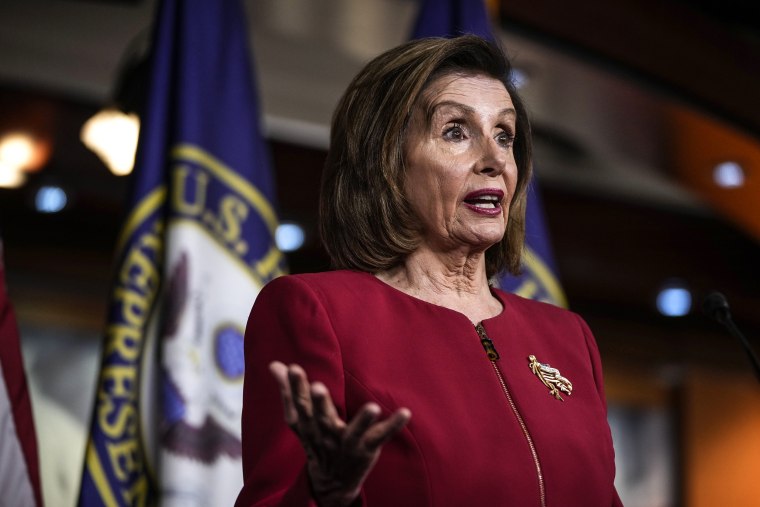WASHINGTON — When the House returns Monday, Democrats will face a series of difficult decisions about how to prevent a government shutdown, avert a catastrophic debt default and resolve deep divisions within their ranks about President Joe Biden's economic agenda.
There is little time. Government funding expires Sept. 30, the Treasury Department says the debt ceiling will be breached in October without congressional action, and states need disaster relief.
Meanwhile, Speaker Nancy Pelosi's complicated set of promises to competing party factions will face a major test. Pelosi, D-Calif., has promised centrists a deadline of Sept. 27 to vote on the Senate-passed infrastructure bill. But she has told progressives that it will move side by side with the multitrillion-dollar Build Back Better measure.
Rep. Pramila Jayapal, D-Wash., chair of the Congressional Progressive Caucus, has said for months that dozens of House Democrats are prepared to vote down the infrastructure bill if the larger spending bill isn't done.
That means a cornerstone of Biden's agenda risks a humiliating defeat in the House if party leaders don't rapidly resolve a slew of differences among Democrats over price tag and policy in the bigger bill, which includes priorities like child cash payments, Medicare expansion, community college subsidies and tax increases on the wealthy.
A House Democratic aide said party leaders remain confident that progressives will hold the line. Others doubt that they would tank a centerpiece of Biden's agenda in a bid for leverage over a different bill.
'A Rubik's cube on steroids'
Nine centrist Democrats led by Rep. Josh Gottheimer, D-N.J., issued a joint statement Friday to rally support for the infrastructure bill and to remind Pelosi about her promise of a vote by Sept. 27. They said Congress "cannot afford to delay a single day."
House Majority Whip James Clyburn, D-S.C., said Sunday on CNN's "State of the Union" that Democrats are working to "make sure that we never get to that point" where the infrastructure bill could fail.
"We are working with everybody in all corners of our party," he said. "They're trying to get to a common ground on all of these issues. And I feel very comfortable that we are going to get there."
Clyburn said Democrats "ought to stop focusing on the number and start looking at what needs to be done" when it comes to the spending bill.
House Budget Committee Chair John Yarmuth, D-Ky., floated an outside-the-box option: Pass the infrastructure bill on Sept. 27, but don't send it to Biden's desk yet.
"The speaker does not have to actually advance the bill to the — if we pass it in the House — does not actually have to send it to the president for signature. She can hold on to that bill for a while," Yarmuth said on "Fox News Sunday." "So there's some flexibility in terms of how we mesh the two mandates."
After House committees finished their work on the Build Back Better legislation last week, Biden held a call with Pelosi and Senate Majority Leader Chuck Schumer, D-N.Y., to discuss the way forward. Biden's approval rating has slipped into net negative territory after a rough end of the summer as the delta variant of the coronavirus threw a wrench into the Covid-19 recovery.
And Senate Democrats say they'll keep trying to put immigration provisions in the bill after suffering a setback on Sunday, when the Senate referee ruled them ineligible for the process.
Sen. Mark Warner, D-Va., a member of the Finance and Budget committees, compared the challenge to "a Rubik's cube on steroids."
Averting shutdown and default
Apart from Biden's goals, Congress faces imminent hard deadlines to keep the government functioning.
Majority Leader Steny Hoyer, D-Md., has told colleagues that the House will vote on a bill to keep the government funded this week. He said it will include extra aid for disaster relief after recent storms and money to resettle allies displaced after the U.S. withdrawal from Afghanistan.
"The House will also take action to suspend the debt limit to ensure that America pays its bills on time," Hoyer said in a letter Friday, without specifying whether it would be a standalone measure.
Democrats have considered attaching a debt limit extension to the government funding bill ahead of the October deadline to keep paying America's bills, but that faces broad Republican opposition, and it could cause a shutdown if the GOP minority, which has the power to block bills in the Senate, doesn't relent.
Sen. Bill Cassidy, R-La., a member of the Finance and Joint Economic committees, said Sunday on NBC's "Meet the Press" that Republicans don't intend to "aid and abet party-line spending" by lifting the debt ceiling.
"If you want to come back and meet where we can actually find common ground, where we can actually address needs, as opposed to a Democratic wish list, well, then we'll help," Cassidy said.
Experts say failure to lift the debt ceiling would be catastrophic for the U.S. and global economies. It requires 10 Republican votes through the regular process. Democrats, who have rejected putting it in their party-line bill, noted that they agreed to help Republicans extend the debt limit after the partisan tax law of 2017, which added to the deficit. They say the GOP should do the same now.
Also this week, Hoyer said the House will advance the defense authorization bill and vote on the Women's Health Protection Act to codify abortion rights protections under Roe. v. Wade into law.
"This legislation would enshrine access to reproductive health care into law for all women across America," Hoyer said, adding that the House is forced to act because of the Supreme Court's "inaction" on blocking the six-week abortion ban in Texas.

